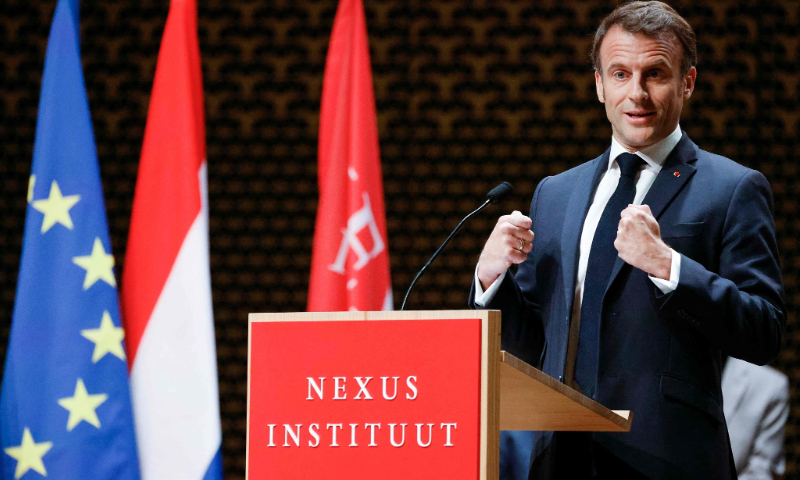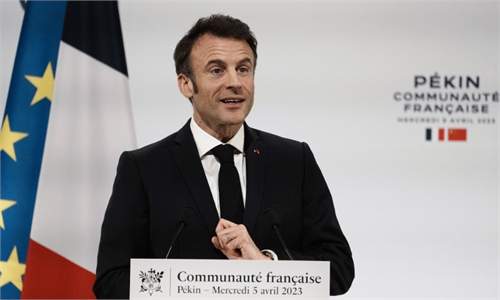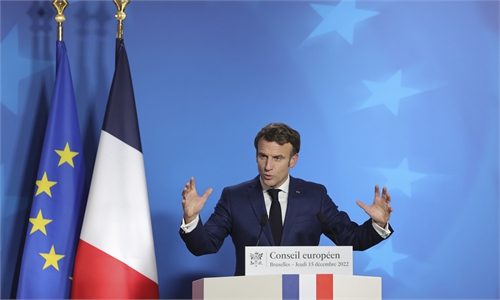
French President Emmanuel Macron delivers a speech to the Nexus Institute in the Amare theatre in The Hague on April 11, 2023 as part of a state visit to the Netherlands. Photo: VCG
Josep Borrell, the European Union's chief diplomat and Annalena Baerbock, German Foreign Minister, originally planned to visit China from April 13 to 15 together. Borrell said on twitter Wednesday that he has tested positive for COVID-19 and therefore unfortunately will need to postpone his visit to China.Europe, wandering amid the current geopolitical upheaval, needs to make a choice. During his visit to China, French President Emmanuel Macron said, "Long live the friendship between France and China!" on his social media account. At the end of his trip, he told the media on the plane that he was against following the US, emphasizing Europe's strategic autonomy and saying Europe should not get "caught up in crises that are not ours" - what he meant is clearly the crisis in the Taiwan Straits. This touches on the most important strategic myth of Europe and causes a strong shock.
US Senator Marco Rubio questioned whether Macron's speech can represent Europe or only France. Former British Prime Minister Liz Truss criticized Macron's recent trip as "a sign of weakness." Other US politicians and mainstream media also attacked Macron, and some voices in Europe also wanted to pressure Macron. But President of the European Council Charles Michel sent key support for Macron on Tuesday, saying European leaders are increasingly supporting Macron's push for "strategic autonomy" away from the US.
"On the issue of the relationship with the US, it's clear that there can be nuances and sensitivities around the table of the European Council. Some European leaders wouldn't say things the same way that Emmanuel Macron did ... I think quite a few really think like Emmanuel Macron," Michel noted. "There is indeed a great attachment that remains present … For this alliance with the US. But if this alliance with the US would suppose that we blindly, systematically follow the position of the US on all issues, no."
Prior to Michel's comments, French Finance Minister Bruno Le Maire also backed Macron, saying that the French president is "perfectly right to demand independence and European sovereignty." Just because we are allies of the US does not mean we should be against China, he added.
It has become a big debate to clarify the foreign strategy when Europe may be strategically lost and defend its own strategic interests. Macron, who clearly does not want to back down in the face of pro-US opinion in the US and Europe, further said during a visit to the Netherlands on Tuesday that the EU must form an independent position in five key areas, including trade, competitiveness and European industry.
"We want to be open," he said. "We want allies, we want good friends, we want partners. But we always want to be in a situation to choose them. Not to be 100 percent dependent on them. We must be able to choose our partners and shape our own destiny."
France, Germany and the European Union are undoubtedly closer to the US than to China. They have more ties in culture and values, and through NATO tie the two sides of the Atlantic. In the reality of globalization, driven by actual conditions and their own interests, they become US allies and partners of China at the same time.
The current situation is that China respects the autonomy of the EU and actively interacts with the EU in terms of trade in accordance with international rules. However, the US wants to force the EU to move away from its own interest in its relationship with China and move closer to US' China strategy. From preventing European countries from using Huawei's 5G network equipment to demanding further "decoupling" from China in the field of semiconductor technology, it is the US that decides, and Europe follows. Moreover, the bargaining chip put forward by the US is that if European countries do not cooperate, they will face sanctions from the US. No country likes this feeling of being a "vassal."
Next, the US wants Europe to absolutely cooperate with it in building a "Western Taiwan Strait Policy." They want to stand by to sanction China as they did to Russia once the Chinese mainland uses force to maintain national unity. Turning the Taiwan Strait crisis into a "European crisis" is to turn Europe into a tool and use it as a new strategic bargaining chip for the US to play against China on the Taiwan question.
The purpose of the US in doing all this is to maintain its own hegemony. Washington tries to describe the US hegemony as "Western hegemony," while what Europe feels is inequality similar to the "master-servant" relationship. A cold reality is that Europe, which lacks strategic autonomy, is one of the most obvious signs of Western decline. The EU's economic volume once accounted for 30 percent of the world's total. With the economic downturn and Brexit, the EU's GDP now only accounts for 17 percent, but the share of US GDP in world economy has shrunk much less.
The Ukraine war has intensified the EU's dependence on the US for security. When there is a lot of room for debate on whether Europe is helping the US or the US is providing security for Europe, Washington has adopted a "savior" attitude toward Europe. Gordon Chang, one of the main advocates of the "China collapse" theory in the US, reprimanded Macron on Twitter, saying: "if #Europe should not help the #US on #Taiwan, why should the US help Europe on #Ukraine?" This is already blackmailing Europe.
The reality of China-EU relations is very complicated. In particular, Europe, like the US, has ideological differences with China. The US tries to use ideological differences to cover up its geopolitical conflicts with China, describing its containment of China as "a democracy vs autocracy struggle." Some Europeans were fooled, but most Europeans are not. The cooperative relationship between Europe and China will not be smooth. When referring to Taiwan, Macron said Europe should "avoid the trap to be caught in the crises which are not ours," and that the EU should not be a follower of the US. This is destined to be the inner voice of most people in Europe. Yes, Europe does not want to be a puppet of the US.
The author is a commentator with the Global Times. opinion@globaltimes.com.cn



